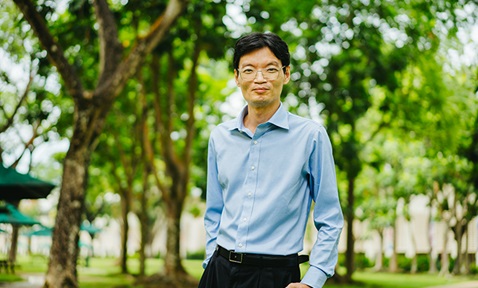From zookeeper to animal health researcher: How NIE PhD propels his mid-career leap into wildlife conservation
Not many non-educators will head to National Institute of Education (NIE) for postgraduate studies but Dr Wang Dajun did. NIE, which is located within the Nanyang Technological University campus, is after all the national teacher education institute.
While the 37-year-old already had a university degree in animal science from Australia, he wanted to further his studies a year into his job as a zookeeper so that he could contribute to zoological research and conservation efforts.
Dr Wang began exploring different postgraduate programmes, and he attended an open house at NIE. Here, he met Dr Norman Lim, a leading ecologist known for his conservation efforts and studies on under-studied native mammals such as colugos and pangolins.
Spurred by the opportunity to learn from an expert he admired, Dr Wang enrolled in a Doctor of Philosophy (PhD) in Natural Sciences and Science Education at NIE, focusing on studying the ecology of free-roaming dogs in Singapore.
Under Dr Lim’s supervision, he learnt advanced research methods, including using motion sensors and machine learning algorithms, which is a subset of artificial intelligence, to track and monitor animals. NIE's interdisciplinary research environment allowed him to collaborate with experts in computer science and engineering, expanding his knowledge in technology and wildlife biology.
One project involved developing smart video collars for animals, similar to fitness trackers for humans. These collars would record video only when an animal moves, providing more accurate data about animal behaviour than traditional methods. The project showed how combining different fields of study can lead to innovative approaches to wildlife research.
Making a career switch to research
Halfway through his PhD studies, Dr Wang transitioned to a research role at Mandai Wildlife Reserve where he applied his research training to improve the health, behaviour and nutrition of captive animals.
A notable project involved investigating why certain catfish species were not thriving in captivity. His findings informed feeding practices and provided updated information for visitors, demonstrating the practical applications of his research skills.
Although not an educator himself, Dr Wang also learnt valuable teaching skills at NIE, such as how to create structured content and design research activities.
He used these skills to design an internship programme at Mandai Wildlife Group, where he drew on the mentorship he received and launched an internship programme to give tertiary students hands-on experience in designing and conducting animal behaviour research under the guidance of experienced zookeepers. This group of student-interns were involved in research projects conducted in the Singapore Zoo, Night Safari and River Wonders.
“It was enriching to guide and support the younger generation,” he says. “I was glad to help these students navigate their own academic journeys and transitions into their future career.”
Besides guiding students, his postgraduate studies also had an enriching impact on his daughter.
At a parent-teaching meeting, Dr Wang could not help but smile when his daughter advocated the presence of free-roaming dogs in the peri-urban environment during the conversation. Peri-urban environment refers to areas on the outskirts of cities.
Growing up with stories of his zookeeper days and joining him on his postgraduate research field trips, where he shared his knowledge of free-roaming dogs, had clearly influenced her.
“It was heartening to hear our conversations about my postgraduate research echoed in her own words,” he said. “This reminded me of the importance of fostering curiosity and critical thinking in young minds.”
Last year, after one-and-a-half years at Mandai Wildlife Group as a researcher, Dr Wang made another career transition to the National Parks Board’s Animal & Veterinary Service via connections he made during his PhD.
In his new role, he monitors biological threats and supports disease biosurveillance research. This work involves collecting and analysing data on human, animal and plant health to detect, monitor and respond to potential disease outbreaks.
This move was particularly exciting as it enables Dr Wang to apply his expertise beyond the zoo setting.
“Considering that the health of humans, animals and the environment are closely linked and interdependent, my work on animal health contributes to the understanding of diseases that affect the community and wildlife,” he said. “I’m happy to be a part of implementing these measures that can enhance the protection of ecosystems.”
-------------------------------------------------------------------------------------------------------------------------------------------------------------------------
Going beyond the classroom: NIE’s PhD programmes for non-educators
While known as the national teacher education institute, National Institute of Education’s (NIE) doctoral programmes offer opportunities for professionals outside traditional education roles.
Its graduates have found success in diverse sectors. Associate Professor Jude Chua, Associate Dean, Graduate Education by Research at NIE, shares that alumni include doctors and nurses in leadership roles, as well as academics and researchers in leading universities.
The institute’s programmes, which include concentrations in areas such as Humanities and Social Studies Education, Mathematics and Mathematics Education, Natural Sciences and Science Education, Psychology and Child & Human Development, and Visual and Performing Arts, focus on education in its broadest sense. Prof Chua explains: “To educate, in its classical reading, is to lead others towards what truly matters. This theme is reflected in our programmes that are relevant to non-educator leaders who not only lead, but also seek to guide.”
These programmes develop skills in critical thinking, technology use for communication, and research methods for evaluating empirical claims – competencies applicable in many professional contexts.
The institute emphasises both teaching and research. Prof Chua notes: “NIE values good teaching as much as research. Our students have informed and competent professors to inspire them and to model after.”
For professionals considering further education or career transitions, NIE's PhD programmes offer theoretical knowledge and practical skills, preparing leaders to guide others effectively, regardless of their backgrounds.
Find out more about NIE’s PhD programmes and apply for the upcoming January 2025 intake.
Read the original article here.
Source: The Straits Times © SPH Media Limited. All rights reserved.





.tmb-listing.jpg?Culture=en&sfvrsn=13b00373_1)

.tmb-listing.jpg?Culture=en&sfvrsn=15e6d6d7_1)